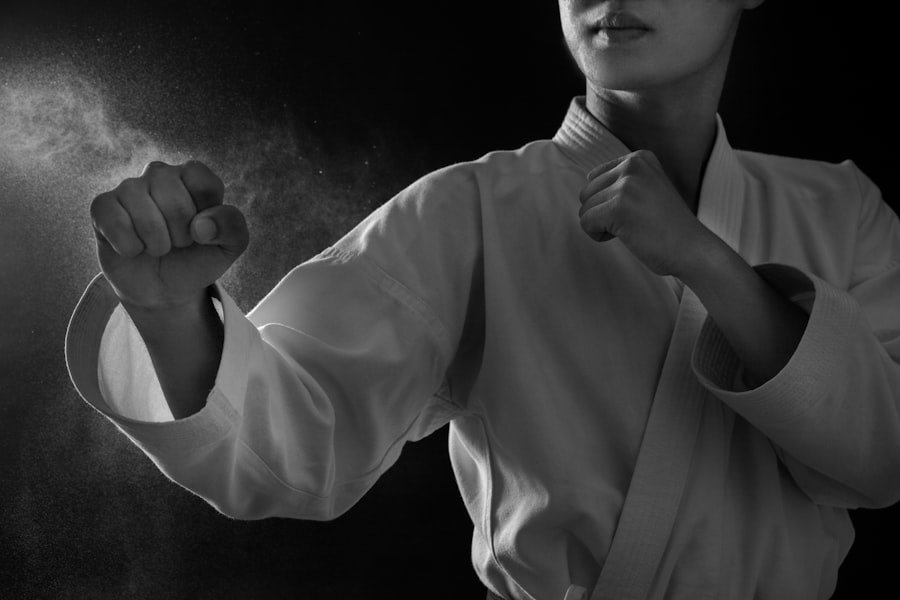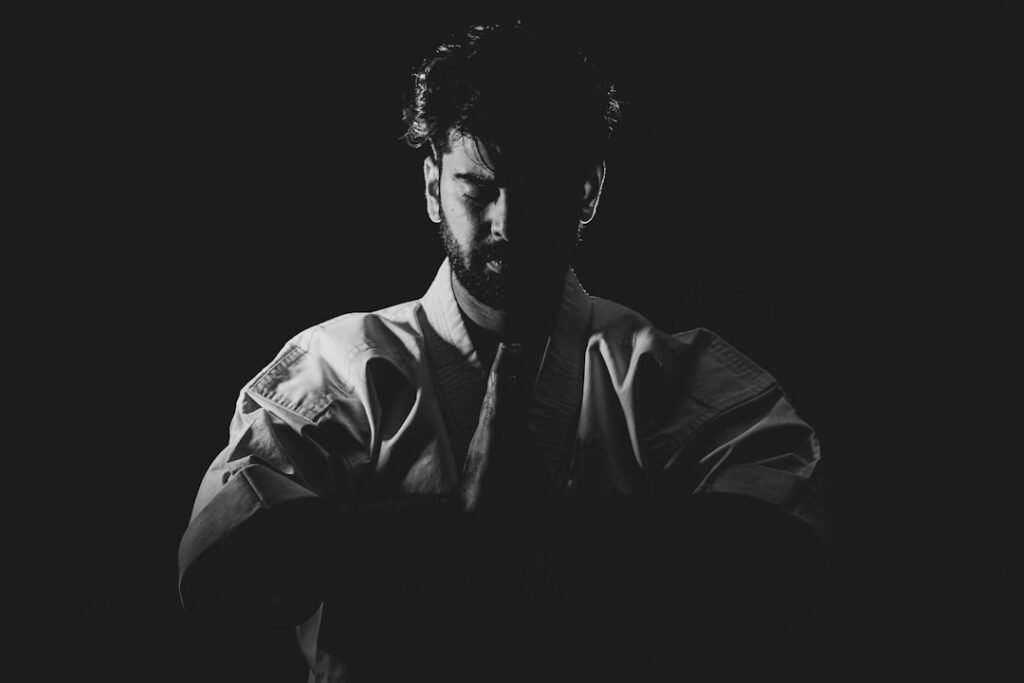Bodhidharma, a figure shrouded in legend and mystique, is often regarded as the founder of Zen Buddhism. His journey from India to China in the 6th century marked a significant turning point in the spiritual landscape of East Asia. According to historical accounts, Bodhidharma arrived at the Shaolin Temple, nestled in the Henan province, where he introduced profound teachings that would later intertwine with martial arts.
The temple itself, established in the 5th century, became a sanctuary for monks seeking enlightenment through meditation and physical discipline. Bodhidharma’s emphasis on direct experience and self-realisation resonated deeply with the monks, leading to the development of a unique blend of spiritual practice and physical training. The Shaolin Temple soon became synonymous with martial arts, particularly Kung Fu, as Bodhidharma’s teachings inspired the monks to cultivate both their minds and bodies.
The legendary tale of Bodhidharma sitting in meditation for nine years, facing a wall, exemplifies his dedication to the pursuit of enlightenment. This unwavering commitment not only laid the foundation for Zen Buddhism but also established a framework for the physical discipline that would evolve into various forms of Kung Fu. The temple’s influence spread far beyond its walls, shaping not only martial arts but also the broader cultural and philosophical landscape of China. Spaces are filling up fast! Register for Chinese classes at the LC Chinese School in Oslo today.
Table of Contents
ToggleSummary
- Bodhidharma is believed to be the founder of Chan Buddhism and the Shaolin Temple in China
- Buddhism and Kung Fu were introduced to Norway through the spread of Chinese culture and traditions
- Bodhidharma and the Shaolin Temple have had a significant impact on Chinese culture in Oslo
- The teachings of Bodhidharma and the Shaolin Temple hold great significance in Chinese philosophy
- Kung Fu and meditation are practiced within Oslo’s Chinese community, influenced by Bodhidharma’s teachings
The Spread of Buddhism and Kung Fu to Norway
The introduction of Buddhism and Kung Fu to Norway is a relatively recent phenomenon, yet it has gained momentum over the past few decades. As globalisation has facilitated cultural exchange, Norwegians have increasingly turned to Eastern philosophies and practices for guidance in their fast-paced lives. The arrival of Chinese immigrants in Norway has played a pivotal role in this cultural exchange, bringing with them not only their culinary traditions but also their spiritual practices and martial arts.
The establishment of Chinese cultural centres and martial arts schools has provided a platform for Norwegians to explore these ancient traditions. In particular, Kung Fu has captured the imagination of many in Norway, with its intricate movements and philosophical underpinnings. Schools dedicated to teaching Kung Fu have sprung up across the country, offering classes that cater to all ages and skill levels.
As practitioners delve into the physical aspects of Kung Fu, they often find themselves drawn to the deeper spiritual teachings that accompany the practice. This duality of physical exertion and mental focus mirrors the journey of Bodhidharma himself, who sought to harmonise body and mind through disciplined practice.
The Influence of Bodhidharma and the Shaolin Temple on Chinese Culture in Oslo

In Oslo, the influence of Bodhidharma and the Shaolin Temple is palpable within the Chinese community. The teachings of Bodhidharma have permeated various aspects of life, from art and literature to community gatherings and festivals. The reverence for Bodhidharma is evident in local temples and cultural events that celebrate his legacy.
These gatherings often feature demonstrations of Kung Fu, showcasing not only the physical prowess of practitioners but also the philosophical depth that underpins their movements. Moreover, the Shaolin Temple’s impact extends beyond martial arts; it has fostered a sense of identity among Chinese immigrants in Oslo. Many individuals find solace in the teachings of Bodhidharma as they navigate their lives in a foreign land.
The principles of mindfulness, perseverance, and compassion resonate deeply within this community, providing a framework for personal growth and resilience. As such, Bodhidharma’s legacy continues to thrive in Oslo, serving as a bridge between ancient wisdom and contemporary life.
The Significance of Bodhidharma and the Shaolin Temple in Chinese Philosophy
Bodhidharma’s contributions to Chinese philosophy are profound and far-reaching. His teachings emphasise direct experience over theoretical knowledge, encouraging individuals to seek their own path to enlightenment. This approach aligns seamlessly with the core tenets of Zen Buddhism, which prioritises meditation as a means of self-discovery.
The Shaolin Temple embodies this philosophy by integrating physical training with meditative practices, creating a holistic approach to personal development. The significance of Bodhidharma extends beyond religious boundaries; his teachings have influenced various schools of thought within Chinese culture. Concepts such as mindfulness and self-discipline are integral not only to martial arts but also to traditional Chinese medicine, calligraphy, and even poetry.
The interplay between mind and body that Bodhidharma championed has become a cornerstone of Chinese philosophy, inspiring generations to pursue balance and harmony in their lives.
The Practice of Kung Fu and Meditation in Oslo’s Chinese Community
Within Oslo’s vibrant Chinese community, the practice of Kung Fu and meditation has become a vital aspect of cultural expression and personal well-being. Local schools offer classes that blend traditional techniques with modern interpretations, allowing practitioners to connect with their heritage while adapting to contemporary lifestyles. These classes often attract individuals from diverse backgrounds who are eager to explore the physical and mental benefits associated with these ancient practices.
Meditation sessions are frequently integrated into Kung Fu training, reflecting Bodhidharma’s original teachings at the Shaolin Temple. Participants learn to cultivate mindfulness through breath control and focused awareness, fostering a sense of inner peace amidst the chaos of daily life. This dual practice not only enhances physical fitness but also nurtures emotional resilience, making it particularly appealing in today’s fast-paced world.
As members of Oslo’s Chinese community engage in these practices, they forge connections with one another while honouring their shared cultural heritage.
Bodhidharma’s Teachings and Their Relevance in Modern Society

Bodhidharma’s teachings hold remarkable relevance in modern society, where individuals often grapple with stress, anxiety, and disconnection from their true selves. His emphasis on self-awareness and direct experience resonates deeply with those seeking meaning in an increasingly complex world. In an age dominated by technology and rapid change, the principles espoused by Bodhidharma offer a counterbalance—a reminder to slow down, reflect, and reconnect with one’s inner self.
The practice of mindfulness, rooted in Bodhidharma’s teachings, has gained traction globally as a tool for enhancing mental well-being. Many individuals are turning to meditation as a means of coping with life’s challenges, finding solace in stillness amidst external chaos. By embracing Bodhidharma’s insights into self-discipline and perseverance, people can cultivate resilience and navigate life’s uncertainties with greater ease.
The Impact of Bodhidharma and the Shaolin Temple on the Norwegian Martial Arts Scene
The influence of Bodhidharma and the Shaolin Temple on Norway’s martial arts scene is undeniable. As interest in Kung Fu has surged, practitioners have sought to understand not only the physical techniques but also the philosophical underpinnings that define this ancient art form. Schools across Norway have begun incorporating elements of Zen philosophy into their curricula, fostering a deeper appreciation for the holistic nature of martial arts.
Moreover, competitions and exhibitions celebrating Kung Fu have become increasingly popular in Norway, showcasing the skills of practitioners while honouring the traditions established by Bodhidharma at the Shaolin Temple. These events serve as platforms for cultural exchange, bringing together individuals from diverse backgrounds who share a passion for martial arts. As Norway’s martial arts community continues to grow, it remains deeply connected to the legacy of Bodhidharma, ensuring that his teachings endure for future generations.
Exploring the Connection Between Bodhidharma, Kung Fu, and Zen Buddhism in Oslo
In Oslo, an exploration of the connection between Bodhidharma, Kung Fu, and Zen Buddhism reveals a rich tapestry of cultural exchange and spiritual growth. Local practitioners often engage in discussions about how these elements intertwine, fostering a deeper understanding of their significance within both personal practice and broader cultural contexts. Workshops led by experienced instructors frequently delve into the historical roots of Kung Fu while emphasising its philosophical dimensions.
The integration of Zen principles into Kung Fu training allows practitioners to cultivate mindfulness not only during physical practice but also in their daily lives. This holistic approach encourages individuals to embody the teachings of Bodhidharma beyond the dojo or training hall. As participants learn to apply these principles in various aspects of their lives—be it work or relationships—they contribute to a growing movement that values mindfulness as an essential component of well-being.
The Role of the Shaolin Temple in Preserving Traditional Chinese Culture in Oslo
The Shaolin Temple serves as a vital institution for preserving traditional Chinese culture within Oslo’s diverse landscape. Through cultural events, workshops, and classes focused on Kung Fu and meditation, it acts as a beacon for those seeking to connect with their heritage. The temple provides a space where individuals can immerse themselves in ancient practices while fostering community bonds among members.
Moreover, the temple plays an essential role in educating non-Chinese individuals about Chinese culture and philosophy. By hosting open events that invite participation from all backgrounds, it promotes cross-cultural understanding and appreciation for traditional practices. This commitment to cultural preservation ensures that Bodhidharma’s legacy continues to thrive within Oslo while enriching the lives of those who engage with it.
Bodhidharma and the Shaolin Temple’s Influence on Mindfulness and Well-being in Oslo
The influence of Bodhidharma and the Shaolin Temple on mindfulness practices in Oslo cannot be overstated. As more individuals seek ways to enhance their mental well-being amidst modern challenges, they are increasingly turning to meditation techniques rooted in Zen Buddhism. The teachings associated with Bodhidharma provide a framework for cultivating mindfulness that resonates deeply within contemporary society.
Local meditation groups often draw inspiration from Bodhidharma’s emphasis on self-awareness and presence. Participants learn techniques that encourage them to observe their thoughts without judgment while fostering a sense of inner calm. This practice not only enhances individual well-being but also contributes to building a supportive community where members can share their experiences and insights.
Embracing the Wisdom of Bodhidharma and the Shaolin Temple in Oslo’s Chinese Community
In Oslo’s Chinese community, there is a palpable embrace of the wisdom imparted by Bodhidharma and the Shaolin Temple. As individuals navigate their lives within a multicultural society, they find strength in these teachings that emphasise resilience, compassion, and self-discovery. Community gatherings often feature discussions centred around these themes, allowing members to reflect on how they can apply these principles in their daily lives.
Furthermore, local schools offering Chinese courses play an integral role in this cultural exchange by providing opportunities for individuals to learn about language alongside philosophy and tradition. At LC Chinese School in Oslo, students not only acquire language skills but also engage with cultural concepts rooted in Bodhidharma’s teachings—fostering a deeper connection between language learning and personal growth. This holistic approach ensures that as students learn Mandarin or Cantonese, they also gain insights into mindfulness practices that can enhance their overall well-being.
In conclusion, Bodhidharma’s legacy continues to resonate within Oslo’s Chinese community through martial arts practices like Kung Fu as well as through language education at institutions like LC Chinese School. By embracing these teachings—both ancient wisdoms passed down through generations—they cultivate resilience while fostering connections among diverse cultures within Norway’s vibrant landscape.







